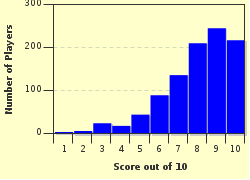Quiz Answer Key and Fun Facts
1. The song that ranked second in 1974 charted for 21 weeks, three of them at Number One. However, worldwide it sold 11.5 million copies and easily was the biggest hit globally for the year. The first two lines of the song should be ample for a lyrical clue but we'll give you the entire first stanza. What was this hit?
"Goodbye to you my trusted friend
We've known each other since we were nine or ten
Together we climbed hills and trees
Learned of love and A B C's
Skinned our hearts and skinned our knees"
2. Number One for a week in 1974 and rated the 7th biggest hit for the year was the song containing these words:
"Some people call me the space cowboy, yeah
Some call me the gangster of love
Some people call me Maurice"
What was the title of this hit?
3. "Don't look Ethel!" These three words, shouted three times during the course of the "song", constitute your lyrical clue for the 11th ranked hit of 1974. It spent three weeks at Number One during a 17 week stay on the charts. It also topped the Canadian charts for three weeks and the U.K. charts for one. What's your guess?
4. "And the jailer man and Sailor Sam were searching every one"
Somehow, I think this brief snippet from the song ranked 26th in 1974 will be sufficient for you to identify this hit that spent a week at Number One. Am I right? What song was it?
5. Another one week chart topper accumulated sufficient points to rank 30th for 1974. Performed by a Canadian singer/songwriter, let's see if you can identify it with assistance from this slice of lyric.
"Ain't it good, ain't it right
That you are with me here tonight
The music playin', our bodies swayin' in time"
6. With a total of 35 hits achieving Number One status on the Billboard Hot 100 chart throughout the year of 1974, it's not surprising that there were a raft of them that only stayed on top for but a week. This one was yet another. It concluded the year ranked 33rd. Here's a bit of the lyric.
"I can see her lyin' back in her satin dress
In a room where you do what you don't confess
_______ ya better take care
If I find you been creepin' 'round my back stairs"
Fill in the blank with the title of the song.
7. Another one week Number One hit worked its way to 40th place in the year-end rankings for 1974. It was one of two Number One hits that year where a "stuttering" vocal is featured. Here's a sample of the lyric, you identify the song.
"I met a devil woman
She took my heart away
She said I had it coming to me
But I wanted it that way
I think that any love is good loving
So I took what I could get"
8. A British group garnered the 53rd spot in year-end rankings for 1974. Their hit topped the Billboard charts for one week, what else, but was Number One in Canada for three and Australia for eight! Ironically, it wasn't a chart topper in the U.K., stalling at Number Three. What song do we have here?
"And the sound of the battle rang through the streets of the old east side
'Til the last of the hoodlum gang had surrendered up or died
There was shouting in the street and the sound of running feet
And I asked someone who said 'bout a hundred cops are dead"
9. In 1974, the seeds for disco music were being germinated. The official Billboard chart to track this genre first appeared in the October 26, 1974 edition of the magazine. However, four Number One songs from 1974 could plausibly lay claim to being the first disco song to be Number One on the Hot 100. We will focus on one of them, a hit ranked 60th for the year. With two weeks at Number One, it joined only eleven others to stay at the top for more than a week. Ultimately, the song would sell over 11,000,000 copies and top the music charts in over 80 countries! Name it with this lyrical hint.
"There's nothin' to it just say you wanna do it
Open up your heart and let the lovin' start"
10. "I was defeated, you won the war
Promise to love you forevermore
Couldn't escape if I wanted to
Knowing my fate is to be with you"
This lyric sample is a little tougher than most of the others in this quiz but it was the best that I could do with what I had. If you read carefully and deliberate over the choices, it should come to you. This hit peaked at Number Six on the Billboard Hot 100 and with 17 charting weeks, secured 70th spot in the rankings. A further clue - it was Number One in the U.K. and a much bigger hit around the world than it was in North America. What song was it?
Source: Author
maddogrick16
This quiz was reviewed by FunTrivia editor
gtho4 before going online.
Any errors found in FunTrivia content are routinely corrected through our feedback system.

